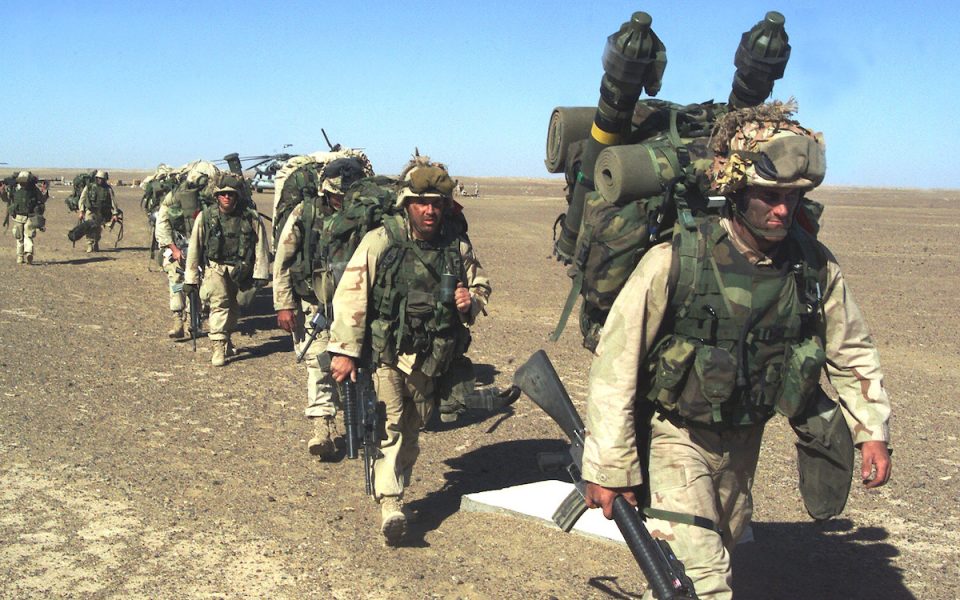“The Afghanistan Papers,” the Washington Post’s three-year
investigation finding that US officials consistently lied to the public about
the failure of America’s longest war, is dropping on the same week that the US
House is introducing articles of impeachment against President Trump.
These two phenomena are more
connected than one might think.
To be clear, Trump is being
impeached because he attempted to subvert US foreign policy in Ukraine to
extort assistance from a foreign head of state to smear a political opponent,
not because of his role as commander in chief in the Afghanistan war. But the
partisan hatred — with each side embracing mutually exclusive narratives —
exposed by the impeachment process is surely connected in some way to the
imperial overreach that gave us an aimless war fought by a tiny and often
alienated warrior class. No one knows why we’re in Afghanistan or how to get
out, and in the absence of a shared national purpose, we’ve turned our fury on
each other.
The United States government has wasted blood and treasure in Afghanistan, for nothing.
It took scarcely six months to chase al-Qaida — the perpetrators of the 9/11 attack — out of Afghanistan, but three successive administrations, from Bush to Obama, and now Trump have continued to wage war. The Taliban, stronger than ever, is just waiting for the United States to pull out before they reclaim control.
According
to the Post’s six-part series, the United States has spent between $934
billion and $978 billion on the war in Afghanistan, not counting the CIA’s
classified budget and the money spent by the Department of Veterans Affairs,
which cares for wounded veterans. The expenditures include more than $133
billion in development funds — more than the United States “spent, adjusted for
inflation, to revive the whole of Western Europe with the Marshall Plan after
World War II.”
The war
has cost the lives of 2,300 US military personnel and 3,814 US contractors, not
to mention 64,124 Afghan security forces and 43,074 Afghan civilians.
The Post
investigation is largely based on a trove of documents from a secret
government study by the Office of the Special Inspector General for Afghanistan
Reconstruction, or SIGAR, which interviewed hundreds of US officials and
allies.
The study found that those planning and fighting the war have been unclear on the mission of the war and even who they were fighting.
“What
were we actually doing in that country?” an unidentified US official said in a
government interview, according to the Post. “What are our objectives?
Nation-building? Women’s rights? It was never fully clear in our own minds what
the established goals and timelines were.”
Likewise,
the Post quotes an unnamed former adviser to the Army Special Forces as
telling a government interviewer in 2017: “They thought I was going to come to
them with a map to show them where the good guys and the bad guys live. It took
several conversations for them to understand that I did not have that
information in my hands. At first, they just kept asking: ‘But who are the bad
guys, who are they?’”
The
development aid, which peaked under President Obama, was dispensed with little
strategy or accountability. According to the investigation, one unidentified
contractor reported that he was expected to distribute $3 million daily for
projects in a single Afghan district roughly the size of a US county.
US
military personnel felt contempt for their Afghan counterparts.
The Post
investigation said one unidentified US soldier said Special Forces teams
“hated” the Afghan police whom they trained, calling them “awful — the
bottom of the barrel in the country that is already at the bottom of the
barrel.” A US military officer estimated that a third of the police recruits
were “drug addicts or Taliban,” while another “called them ‘stealing fools’ who
looted so much fuel from the US bases that they smelled perpetually of
gasoline.”
With the largest military in the world by far, it seems that the United States needs an endless war to justify the exorbitant spending on weapons development and maintenance of foreign bases that keeps the enterprise going.
War
fought for no purpose, sacrifice without discernible benefit, often portends a
blowback of disillusionment and betrayal. And so perhaps we shouldn’t be
surprised that Americans increasingly view one another as enemies, based on
party affiliation and political identification.
The
legacy of the war for Afghans is another story for someone else to tell, but we
should also be mindful of what it means for the US service members who are
navigating their return to civilian life.
If our
civic culture seems extreme today, the hangover from war has often produced
extremism.
As
Kathleen Belew writes in her 2018 book Bring the War Home: The White Power
Movement and Paramilitary America, Louis Beam, a Vietnam war veteran and Ku
Klux Klan leader made the connection explicit in a collection published in 1983
called Essays of a Klansman.
“When he
exhorted readers to ‘bring it on home,’ he meant a literal extension of
military-style combat into civilian space,” Belew writes. “He referred to two
wars: the one he had had fought in Vietnam and the white revolution he hoped to
wage in the United States.”
Join the First Amendment Society, a membership that goes directly to funding TCB‘s newsroom.
We believe that reporting can save the world.
The TCB First Amendment Society recognizes the vital role of a free, unfettered press with a bundling of local experiences designed to build community, and unique engagements with our newsroom that will help you understand, and shape, local journalism’s critical role in uplifting the people in our cities.
All revenue goes directly into the newsroom as reporters’ salaries and freelance commissions.


Leave a Reply